#i hate government oppression but for-profit oppression is fine
Text
I mean fundamentally the thing about Israel/Palestine that makes people uncomfortable is not that "it's complicated" it's that it's extremely fundamentally morally simple, it's just difficult
there is not a morally acceptable solution that will be accepted by the expansionist Israeli government or its allies in Europe and America
the balance of power has remained basically the same since Balfour handed the country over. Israel has the power to displace and kill Palestinians without accountability because it's backed by the majority of major world powers. there's fundamentally no back and forth of power. Palestine and its people were sold from the control of the British to the control of Israel for the political convenience of a bunch of people on different continents. there's no retribution or wrestle for power. Israel has had power over Palestine for decades and Palestine, despite Palestinians occupying the land for millennia, has never had power over Israel.
the fundamentals of the situation are discomforting because Israel is in many ways the last surviving bastion of the type of turn-of-the-century colonialism which the contemporary economy of Britain, America and much of the West is rooted in.
that's why the media and political classes are so invested in the Israeli party line - not because Israel ~controls the media~ or whatever but because the fundamental existence of Israel is the interests of the British ruling class, for example. It is in the interests of the British ruling class that we accept as a basic precept that there are Civilised and Uncivilised nations, and that it is right and good and natural that the Civilised nations should be able to decide the fates of the Uncivilised nations, for their own profit, without brooking any complaint from the Uncivilised Peoples. The structure of Western capitalism requires, as well, that we accept that any number of deaths and any amount of suffering among the Uncivilised Peoples is an acceptable price to pay for the comfort of Civilised Peoples. That's why the media classes are more interested in pearl clutching that somebody slashed up a hack painting of a famously antisemitic and genocidal British lord than in the loss of swathes of priceless and irreplaceable artworks, historical relics and Human Fucking Lives in Gaza.
it isn't complicated. it's just uncomfortable because fundamentally it lays bare the basic reality of colonial capitalism, and generally we in the UK are sort of trying to pretend we're over that whole thing even though we're obviously not, politicians just try to be a bit less obvious about it. so it's discomforting to people to be faced with the rawness of Israel's open colonialism, and so those who can't or don't want to divest from Britain's own ongoing colonial endeavours end up tying themselves in knots trying to justify why it's Fine Actually.
while obviously Israel is a Zionist project so it can no more be decoupled from Judaism than the British empire is decoupled from Christianity, the conflation of Jewishness and Israel is a mostly irrelevant (and harmful) distraction from the underlying Problem With Israel, which is that it's an incredibly 19th century European style of colony in 21st century Asia, and the nature, consistency and ferocity of its colonial project has been pretty unchanged for like 3-4 generations.
but it's a very successful distraction because
a) a lot of people do actually hate Jews a whole bunch so yeah antisemitism is a genuine and legitimate fear, but it doesn't connect to the core issues of genocide, oppression and colonialism (and conflating Israel with Jewishness does play into existing antisemitic ideas of the Jewish perpetual foreigner and perpetual dual loyalty)
b) people want it to be complicated. They don't want it to be simple in a way that would create discomfort for them. We don't want to acknowledge that to free Palestine we'd have to take a hit to our own economies by not selling arms to Israel. We don't want to acknowledge that what's practiced openly in Israel is the same structure of systemic injustice underpinning almost all British and American foreign affairs, but with more of a veil over it. We don't want to challenge the underlying assumption that there are those who should rule and those who should be ruled over. But with the assertion that Israel=Jewishness, and the rewriting of history to say there's an Endless Cycle of Violence on Both Sides, Who Can Say Where It Started Really, you're off the hook! It's Complicated! Who Can Really Say?
(this Who Can Really Say thing is fascinating in itself. It's not like it's ancient history! it's been slightly over a century since the birth of the Israeli project! you can look it up! we have the news articles! we have the correspondence! this is my grandparents' generation not the distant mists of time!)
but yeah like fuck 'Israel controls the media' bullshit. It does not require a Shadowy Jewish Cabal of Puppetmasters to create mass appeasement from the media and ruling class, and if you think that's the best explanation you're fucking gross. The media and political establishment of Europe and the US are not being Controlled By The Wicked Jews. They are colonial projects. Israel is a colonial project. Their interests are aligned. It's not complicated it's So Fucking Simple. Our ruling classes, whether in Tel Aviv, Washington, Westminster or Berlin, are enthusiastically invested in the project of global apartheid. It makes them money. It maintained them power. It is in their interests to preserve the impunity of the occupying state where it shores up the civilised West vs barbarian East paradigm. It is not "too complicated" it's just huge, implacable and miserable to recognise.
202 notes
·
View notes
Text
Tocktick - Our Two Villains Meet by ResidentoftheDisc/H.M
Norris sat seething in the corner of the Branded Crow, his third pint untouched and a stolen newspaper spread across the table.
The headline was, of course, sensationalist and mildly confusing – DEVITT DOMINATES with a byline admitting, NEW ENGINE CATAPULTS CREW TO NEXT ROUND – while the article penned underneath was a more restrained summary of that day’s leg of the Throgmorton race and the author’s tentative predictions on this new piece of technology. He glared at the third lumograph down, ignoring the image of a triumphant Devitt lifting the flag and the one showing the Elmstone siblings fixing their sails, seeing a shot of Talas, Maia, and Emmett standing by the engine. Emmett looked uncomfortable, his face-half turned away and blurred.
No need for that, Norris thought scornfully. I don’t have any proof.
He knocked back his pint, slamming it on the table with enough force that a few of the drunks slumped against the bar looked around. Dark hells, twenty years wasn’t enough to forget the face which had gotten him fired – Emmett Askren was Juan St Ciel, he was sure of it.
It was odd. He hadn’t thought of the youth beyond occasional night-time self-pitying sessions for nigh on a decade and a half now. But one look at his face and it had all come rushing back. The glow of triumph at getting to kill two birds with one stone was enough to excite him into action – stop Katsaros from putting a dent in Gorge’s considerable profits and bring down an elusive past ghost.
Then he remembered that he had no papers, no people who still recalled the man in question. His old bosses were long-dead, the institution in question abandoned and across two oceans. No one cared.
Except him, of course.
His hands were itching. He wanted to hit something, someone for just looking at him funny. He scowled at the other patrons, wondering who would last longest in a fight. None of them looked promising; slug-like middle-aged dockworkers, a few chirpy and withered grandmothers, youths with brittle limbs and prematurely lined faces.
By the Sunlight God’s arse, he hated this place. All the fight had been beaten out of it years ago. A kind of grey inevitability reigned over the inhabitants. The crime consisted of drug-addicts and smugglers rather than any firebrand riots. Barfights here and there, attacks on native and Empire-imported inhabitants by the opposing sides, but there was no real spark to it. It was like the islands permanently had developed low-grade tension headaches. It wasn’t fun.
The tavern door swung open. The entire room’s – including Norris’ – attention flickered towards it. They all stayed there. Norris frowned slightly.
The man who strode inside was tall, about sixty-five or so years of age, with a neatly trimmed white moustache, beard and swept-back hair. He carried a black cane, but he moved like a dancer, perfectly aware of where he was in the space. The smoke and dirt had settled deeply into his jacket – it had probably been an ivory sort of colour once, but it was now an unpleasant shade of brown. His boots were high-quality and foreign; Eastern by Norris’ guess.
He was also maddeningly familiar.
Either ignoring or oblivious to the stares, the man strode straight up to the bar and flashed a smile at the barkeep. Dipping a hand into his pocket, he spoke in a voice too low for Norris to hear and then produced a rectangular lumograph card. He slid it across the bar – paying no attention to the man next to him peering over his shoulder.
The barkeep made a show of looking it over, but Norris knew that he would disavow all knowledge of the image’s subject. There was a reason that the Helionites’ luminary of protection was also the guardian of those behind the bar.
Not that it was religiously motivated here, he thought scornfully, self-preservation was the saying of the day.
The barkeep shook his head and silently gestured to the taps. The hand held up in response was white and too fine-boned for his frame; if this man had ever done manual labour it had been a lifetime ago.
Then he lifted his cane and rapped it carefully but firmly on the wood of the bar.
It was completely unnecessary. He was the most fascinating thing in the building. The gazes only became open.
Norris sat back in his chair, fingers flat on the table, waiting.
“Good evening, ladies and gentlemen,” the voice was velvet and ridiculously affable, “I request merely a few minutes of your time to assist me with a most important matter.”
A speech like that should have gotten a bottle smashed over his head immediately, but the situation was so unusual, so odd that the tavern was held back in their chairs and captivated. It probably helped that his accent was Eddorian – another small country swallowed by the Empire years before – and therefore not the voice of their brutish overlords, but the sound of another subjugated ally seeking assistance. In the hierarchy of the oppressed, Eddor was not high on the list having surrendered quickly and been permitted to keep much of their culture due to it being so similar to the Empire. But it was still a colony and that meant a form of trust among the Islanders.
Norris was rather proud of himself for the observation, but not so much that he didn’t listen intently to the man’s next words.
“I am buying the next round,” the proclamation was met with owlish silence, “And as you collect your drinks, I will show you a lumograph. I request that you look it over most carefully. And if you know anything about the man – anything at all from having glimpsed him in the street to him being your missus’ lodger – I bid that you tell me. I will pay a sixpence for each truthful piece of information you give.”
The edge to truthful was the flash of a hound’s fang before it growled.
No one moved. A sixpence to Norris was a measly sum – to an Islander it was a good week’s labour, but their pride would not allow them to take payment for informing on someone who (for all they knew) was an enemy of the Empire.
The man regarded the crowd carefully, hand curling tightly about the cane. For a heartbeat, his expression was of frustrated bemusement before the warm smile crept back.
He laid his free hand on his heart and said, “I have come upon my own accord and no one else’s. This a matter of personal import. I am not – and never have been – affiliated with this nation’s government.”
There was some half-hearted shuffling of the patrons once they had figured out the word affiliated. They formed a dense queue, each person staring down at the lumograph before indicating an answer to the man’s question. Once the brief conversations were done, a mug was pressed into their hands, generously filled with beer.
Norris didn’t move from his seat, attention locked on the stranger’s face. He kept his friendly mask fixed firmly in place, but his stance became tenser as the line grew shorter.
He was evidently not getting the answers he was seeking.
As the last patron turned away to enjoy their reward, the man’s gaze fell on Norris. He pushed off the bar and strode over, made invisible by his gift of alcohol.
Norris made a show of studying the newspaper as the man sat down at his table. He heard the whisper of card as it was pushed across the wood.
“Take a look, please.”
Norris did not look up. “Are you going to increase the price?” he asked, “How much is this man worth to you?”
“A lot.” The voice was low, and he heard a discordant note in it. It wasn’t anger, but he had the man’s attention; whether he was willing to play Norris’ surly game was a different matter altogether.
“Hm.” He stared unseeingly down at the paper, waiting to see what the man would do.
“But I wouldn’t insult you by offering more money,” the man continued quietly, “However, I would ask that you look.”
Sighing heavily, Norris did. The image showed a male – maybe in his late fifties, early sixties – sat easily in a chair half-smirking at the lumeretta. He had a compact build, not-quite round face with wide-set eyes, and a mane of hair too long for a fashion-conscious Empire man. The lumograph had the usual muddy shade to it, so he couldn’t make out what kind or colour the shirt was save that it was not dark.
He was ready to turn away and disavow all knowledge when he realised that he did recognise the man in question. There was something about the mouth, the insolent smile struck a shard into his memory.
But he couldn’t grasp it from the mire. Norris sucked his teeth and then stopped, realising that the stranger was reading him like a book.
“You know him.” It wasn’t a question. The fangs were extending again.
Norris drummed his fingers on the table and decided to be truthful. “There’s something I recognise,” he began, “But I cannot recall what it is. But I have seen him. And recently.”
The swirl of emotions in the man’s eyes was gone too quickly for him to read. Norris leant back in his chair, interlocking his hands. He gazed coolly upwards.
“Do I get a sixpence?” he asked.
The man smiled. He fished inside his jacket and brought out a small embossed card. “Better,” he replied, “Here. If you do recall anything of note, please either come or write to this address. You’ll receive more than just a sixpence.”
“A whole crown, perhaps?” He did not keep the sarcasm from his tone.
The man inclined his head, acknowledging him. “Perhaps.”
He made to stand, tucking the lumograph into his jacket pocket.
@queer-crusader @rebelqueenofthediscovery @cogesque
2 notes
·
View notes
Photo

Against Woodstock
“Rock Imperialists” by Mark Kramer, Liberation News Service, 1969
NEW YORK (LNS) The list of stars who will show up at the Woodstock Rock Festival this August is mighty impressive—as fine as any ever. There's everyone: Joan Baez, the Who, Joe Cocker, Janis Joplin, the Jefferson Airplane, Ravi Shankar, Blood Sweat and Tears, Creedence Clearwater Revival, Richie Havens, Canned Heat, Arlo Guthrie,, Tim Hardin, Johnny Winter, the Band, Iron Butterfly, The Grateful Dead and the Incredible String Band, for example.
The arrangements to help you spend three days in the wilds sound as impressive as the list of stars—free campgrounds, ample water and outhouses; free rice kitchen for the poor and hungry; catering by Nathan's of Coney Island craft booths which might just be bivouac head shoppes, and which might be craft booths.
So the rock imperialists deliver the goods. When you want a banana, United Fruit sells a good banana. And when you want a rock festival, Woodstock Music and Art Fair, Inc., sells a good rock festival—at $7 a day. The Guatemalans who grew the bananas get to eat an occasional bruised model. And the street people, the denizens of the lower east side, of the Haight, let them eat free rice and maybe they'll hear the sounds wafting out past the gates.
But they made the culture which the rich fops imitate. Walk down St. Marks Place in the East Village and dig the crowd on either side of the velvet rope which separates those with the bread ($10 a couple) to get into the Electric Circus from those who beg spare change to buy a knish.
On the rich side, the same outfits as on the poor side, except ironed and cut from finer cloth—bell bottoms, groovy vests, mucho hair, svelte girls in granny glasses. On the poor side, it's hip...on the rich side, it's a shuck, it's an imitation of Hip. It's fancy boutique clothes cut to look like the old surplus clothes which the street people once wore out of poverty, thereby creating a style.
For some, the dress constitutes a case of 'going native' for a night on the Bowery. For others it's simply high fashion. The impulse for kids to dress 'well' is plugged in nasty trend-setting magazines like "Seventeen" and supported by the huge cloth and garment companies, the cosmetics companies and the hygiene-freak companies.
The sales job for fashion is easier than others—for the styles come complete with a built-in image. Marlboro has to spend millions to rope together its cancer-sticks and he-manhood. But the Fashion-Makers have it easy this year, because the clothes styles which they plug were once part of a genuine revolutionary and romantic lifestyle.
So America's teenagers are exploited by big companies that hold 'lifestyle' out as bait. "BUY THIS AND YOU WILL BE..." You will be what? Hip?
You'll own another piece of snappy clothing, you'll be able to crowd the poor girl down the block still further, you'll earn your ticket to daydream about running toward him through tall fields of hay, arms stretched toward the sun—the kind of daydream they push in ads for cunt deodorant.
And the kind of daydream they push on album covers. “But (you say) album covers are great. I trip, and look at album covers, and…etc." But it ain't that way. Rock may have come from the Street people, along with styles that grew out of buying surplus clothing, and daydreams that grew out of mystic studies and sunshine state habits. And the communication between the performing artists and you may still bear the same free-you-up message.
But in between you and the performer, there's billions of dollars that you're paying and (for the most part) he's not getting. Who is getting it? The huge companies that own the record empires.
Here's the puzzle: the same companies that own the recording contracts and record studies which make 'liberated' music, also own government contracts and subsidiary companies which make electronic bombing equipment, spying equipment, death equipment which is used in Vietnam and in our other colonies.
The companies don't care how they make money, as long as they make the money. If they can make it from anti-war youth culture by coming on hip, they'll do it. And if they can make it from killing Vietnamese and killing off thousands of years of Vietnamese culture with expensive weapons systems for the government, they'll do that too.
For example, CBS owns Columbia records, Masterworks, Blue Horizon, Odyssey, Harmony, Date, Okeh and several other record companies. They have invested heavily in defense contracts as well, working especially in the areas of laser beams, radar, spy photography, underwater detection—the sorts of technological work which keeps up the arms race and makes fat profits.
It's the same story with most of the other major record companies. Like true imperialists, they'll go wherever the market is, talk whatever language (be it Vietnamese or hip-ese) needs talking, sell whatever people will pay for, as long as they make a profit.
Does this mean you shouldn't buy records? No, of course not. If you wanted to live in this country without supporting the death machine, you couldn't eat or turn on an electric light. What it means is that you should understand a few facts of life. When you sit down with a sandwich (made of food processed by big business) and when you take a bite of the sandwich and start listening to music of YOUR culture, peddled for the profit of THEIR culture, then dig it!
That's the corner they've got you backed into. Supporting the very things you hate the most in order to get the few things you want. There's a revolutionary movement growing in this country to fight just that form of oppression.
What has this got to do with Woodstock? You might go there and have a fine time, but just remember that someone is making a million on your fun, and it isn't the performers, many of whom come for little or nothing.
We interviewed the promoters setting up the Woodstock Festival, at a press conference arranged by the mid-town publicity company they hired. The conference itself was a slick operation. It passed itself off as a consultation between "leaders of the rock community" and the underground press on how to have peaceful good times for everyone.
They didn't need to consult with anyone. Way back in April they had hired a federal law enforcement official, Wes Pomeroy, whom they described to me as "a very progressive kind of cat."
A very progressive kind of cat who had worked with Johnson on the Safe Streets' Act, and with Republican bigwigs in planning security for their '64 convention at the Cow Palace. That's who the investors ("leaders of the rock community”) consulted with when they wanted security for their investment, not the underground press people.
Even though the press conference handout reads, "We have called a special meeting of the underground press and rock community leaders to discuss ways of developing safe and harmonious pop music festivals.”
Mike Lang and Artie Kornfield and two other partners put up half-a-million bucks. They're expecting big returns from ticket sales, a cut of concession sales, and also from selling TV and movie rights. Artie used to head Columbia Records. He told me, “I’d dig my daughter to be able to eat too."
What about the street people? Mike says "We're not turning our backs on these people—we've got to feed them.” And let them in?
“Don't you feel you're exploiting hip culture for your own gain?” Artie said, "Much of us have the same goal, We want to be able to cut out—not take shit—and go live in the country," Except that for most, it is a dream, not a goal, as long as Artie collects from every freak who wants to hear his music. And except that now that so many people want to cut out, they might find it easier to get together and put a stop to the conditions they want to escape.
What about the riot that happened at the LA rock festival, Artie? "We are them—when they attack us, they are attacking themselves. If you talk about an army, it's got a lot of different wings. We're just another wing.”
Maybe Artie and Mike are fooling themselves and maybe not. But they have extracted from the movement those things which can make them some money—talent, excitement, revolutionary energy, identity with hip looks and talk. But they have missed the heart of the movement. The revolutionary energy of rock and of the movement is a response to oppression—it grew out of the blues, out of the poor white country music, out of the emancipated poverty of the street people and their drug scene, out of the anger about national leaders representing corporate interests, while killing people, anger about how students get lied to and treated in public schools.
The movement is made by and sung by people who oppose exploitation, whether by war elsewhere, or by high prices, racism and low wages at home. The movement is not represented in any way by rich investors getting richer by the profits of rock festivals—even if the investors do look hip and talk hip and know hip people.
By the way, if you do go to the. Woodstock festival (actually, the grounds are located in Wallkill, N.Y.), Wes Pomeroy has a staff of 400 security people working for him, in and out of costume. When he was asked about kids smoking dope there, he said, "We'll do nothing to protect them. There will be narcs there, same as everywhere—they're going to have to pay $7, too."
photograph by Henry Diltz
14 notes
·
View notes
Link
I agree with this blog’s reader, Matt in VA, who says that American conservatives are so stupid about cultural reality, and so rigidly locked in to a 1980s playbook, that they think the real threat to liberty comes from the State. In fact, says Matt (and he’s right), Woke Capitalism is as great a threat, if not a greater one. He writes:
Basically, the State, itself, won’t need to send secret police out to arrest dissidents, and won’t need to censor samizdat directly. The big corporations (working hand in glove with the political elites, of course) will do it for them. Look at the power Amazon already has over the government and politicians — massive billion dollar subsidies for the world’s richest man (the Amazon deals for the headquarters — why not two new headquarters, right, since each deal means an insane profit taken directly from taxpayers!)
This strategy will be massively effective in no small part because conservative elites are so stupid and short-sighted and dogmatic that they will continue to say “the government has no right to interfere in the Free Market, if Google bans you, well too bad and go start your own search engine!” to its own people until its own people are all wiped from the internet altogether. This will mean economic and social pariah status, and conservative elites will tell their own base that they *deserve* this.
…
Put into more concrete terms, Del Noce saw that having failed at economics, the Marxist idea migrated into culture. “Workers of the world, unite! You have nothing to lose but your chains,” proclaimed the Communist Manifesto (1848). The “chains” that the post-1968 Left proposes that we lose are all things limiting personal desire, especially sexual desire. This is why Philip Rieff, in his 1966 masterpiece The Triumph Of The Therapeutic, said that the cultural revolution underway in the West (the leading edge of which was the Sexual Revolution) was far more radical than anything the Communists dreamed up.
These days, people hate the term “cultural Marxism” because it has become an alt-right mainstay, but it happens to be true.
…
You see how this works? If you disagree with Abrams, a black woman, then your argument must be in some way bigoted. Thank goodness Fukuyama is of Japanese, not Caucasian, descent, or he would have been dismissed as an Old White Man. It’s a wonder Beauchamp didn’t say “critics like Fukuyama are functionally telling people like her to go to the back of the bus.” The right-wing version of this would be to dismiss a conservative who says the GOP needs to care more about building a robust social safety net and protecting precarious workers by saying, “Sounds like you want socialism, mister.”
…
Here’s what the identity politics people on the Left (and the journalists who write favorably about them) don’t see.
First, you cannot simply wish away these internal conflicts. It is perfectly understandable, and just, to factor in concerns of racial and sexual minorities into one’s politics. We live in a pluralistic, multicultural democracy, after all. What these IP Democrats are doing, though, is privileging certain groups over others. Look at Legutko’s list of the Left’s traditional enemies, and you’ll find a close correspondence with the IP Democrats’ scapegoats:
1. Religion — traditional Christians are bigots, and their schools are bigot factories
2. The Traditional Family — heteronormative and sexist; must be deconstructed, with toxic masculinity excised, and gender nonconformity extolled
3. The Nation — people who oppose open immigration and globalization are bigots; the history of the United States and Western civilization generally is nothing but oppression
4. Moral Conservatism — the philosophy of oppressors who hate women and gays
5. Classical Metaphysics — there is no such thing as objective truth; “justice” is whatever benefits favored classes
If you are white, male, heterosexual, and religiously and/or socially conservative, and if you have a problem with open borders, well, sorry bud, but there’s no place for you on the ID Left. And if you appeal to old-fashioned liberal ideas of fairness and justice, well, that just goes to show that you don’t understand how privilege works, and that in order for justice to be realized, people like you are going to have to lose their jobs and positions in society.
…
It’s fine for people to talk about economic inequality and jobs. It’s good and it’s necessary to do so! But people should not be fooled into thinking that that’s the only thing the Left is concerned with. It’s not even the main thing. Hence the Woke Menace. If the only thing we talk about when we talk about socialism is the economic aspect of it, we will miss what these people will do to our country.
…
If you are white and male, you would be well advised to stay far away from Isis Davis-Marx, I mean, Davis-Marks. She’s watching you, white boy. Whiteness and maleness are evil.
The fact that in the Yale Daily News, she is able to publish a column with these actual words, whereas a white guy who wrote a column about, say, disproportionate black male crime rates, and ended by saying that, “I’m watching you, black boy,” would be thrown out of school and the campus shut down in a paroxysm of social-justice agony — well, that tells you a lot about the nature of the Woke Menace. It’s anti-human moralists, commissars, and informants all the way down.
2 notes
·
View notes
Text
Watch Out, Feminism Is Coming!
In 2015, a woman was killed by a stranger at downtown of the capital, Seoul. The criminal hid in the public restroom and waited until any woman came in. After 5 men went out, a woman came into the restroom and he stabbed her to death. It came out that the murderer was a schizophrenic and committed the crime because he thought all women have ignored him in the police investigation. It brought a huge controversy to the society: “Was the crime rooted at misogyny or the mental illness he had?”
Obviously, it was a hate crime considering he set his target as ANY WOMAN and actually did not attack the 5 men who came into the place prior to the victim. Chun-Seok Seo, a psychiatrist, said “we need to stop the execrable dispute. The criminal’s wrong thinking against women was the reflection of the misogynic atmosphere in our society.” Even though the murderer admitted he was a misogynist, most Korean men didn’t recognize the presence of misogyny and didn’t sympathize with the fear of women either. They kept explaining why the crime was NOT a hate crime, treated the outraged women as bloody feminists, and cautioned their girlfriends to stay away from those men haters.
We, Korean women, felt fear and anger from the bottom of our hearts. It was NOT just a death of a person whom we didn’t know. The victim could be us, one of our friends, our sisters or moms. At last, the crime, the preposterous argument, and the absence of empathy from the majority of the society became the trigger for us to encounter feminism. The more we got to know our rights under the hoof, the more we got woeful, choked, and enraged.
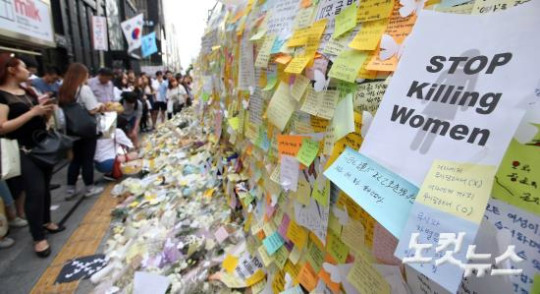
<Mourning for her>
Facing the awful reality, we started making a change. Firstly, about 235,000 people petitioned to the government and over 1,000 women participated in a protest for the legalization of abortion. South Korea has reported the lowest rate of usage of condoms, and the highest rate of abortion among OECD states. Many experts point out that the lack of sex education in school has caused ignorance of birth control. In a society where sex is taboo, sex education for students does not cover the details of birth control and sexually transmitted infection. I did not learn them in my teenage at neither schools nor home. Also, the education is full of sexism and tends to be implemented like an annual event, not like a regular course.
Besides, between the mid of the 1980s and 2000s in Korea, it was common to have an abortion when the fetus was female at the ultrasound examination. The table below shows the number of newborn male babies per 100 newborn female babies. In the red box, we can see the sex ratio rocketed when the baby was the third, fourth, or fifth kid. It represents the households kept giving birth until they got a son. When the fetus was female, it was socially acceptable to have an abortion or name the female baby as a swearing word or a word wishing to have a male one next time. Experts estimate over 30,000 female fetuses per year dead for the last 20 years.

<The sex ratio at birth bewteen 1981 and 1996 in South Korea>
In my country, a woman who got an abortion can be punished with a one-year sentence or $1,800 of fine. Being defined as a crime, an abortion is likely to be operated at an unreliable place and patients cannot be protected by the medical law. Some teenagers who cannot afford the illegal surgery choose to roll down the stairs or hit their bellies. Even if they choose to give birth, they cannot get enough financial support from the government and the whole society will despise them. In contrast, men are totally out of the punishment and responsibility for birth control, bias from the society, and financial support for newborn babies and single moms. The UN Committee on the Elimination of Discrimination against Women urged South Korea to decriminalize abortion and remove punitive measures for women. Yet the government has not put out a solution in response to the petition and some organizations fiercely staged protests against the legalization.
It’s time to ask back the society. Why did you tolerate when people had killed numerous fetuses just because those were female for the last 20 years? Aren’t you putting the blame for the high rate of abortion to women since the country has reported the world’s lowest fertility rate in recent years? Face it. The real reason for the low fertility rate is NOT because women don’t give birth; the birth rate has rather increased since 2011. It is because the society had looked on the femicide with folded arms, as a result, lost hundreds of thousands of women that can give birth.
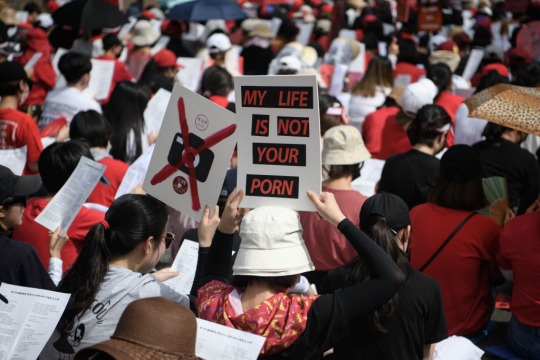
<The protest against illegal shooting/filming of women’s bodies>
The other main resistance is the protest against spy pornography. Around 55,000 Korean women gathered on the street to condemn the creepy society. Shooting and filming women with hidden cameras have been as prevalent as the president admitted the crime was “part of daily life”. The number of cameras —looks like eyeglasses, car keys, water bottles, and neckties— that were found by the police was more than 6,500 in 2017. Criminals for the crime get at most 5-years of the sentence or even get probation depending on the degree of the crime they committed. One ridiculous thing is that those women in the protest had to wear sunglasses, masks, and caps to hide their faces because Korean men do shoot them, upload the pictures on social media, and sneer their appearances, even at the protest which was to criticize exactly that point. Last week, it was disclosed on air that the CEO of an app for booking accommodations had been involved in the website that shares spycam porns. Besides, one heavy uploader of the spycam porns was interviewed that he had earned $268,000 to $357,000 per year as the profits for 3,000 terabytes of the illegal porns and was imposed a fine of $45. Now, Korean women are preparing for the next protest on August 4th in order to urge the government to increase the penalties.
Still, the majority of the society think that feminists are men haters who are “too argumentative and ugly to be loved by men.” A lot of men keep explaining what the real feminism is to us. It seems that they think feminism is something men can allow women to do. WRONG. More and more women are gradually realizing how unfair the way they have been treated is. The more the society oppress us, the stronger we resist. We won’t stop our fight until we win.
This is the end of my writing. Thanks for reading.
For more information of Korean feminism: a blog run by a British man who has lived in South Korea for 18 years.
3 notes
·
View notes
Text
Mark Cuban is standing up to patriotism for profit in sports

Photo by Glenn James/NBAE via Getty Images
Playing the national anthem before sporting events is no longer a way to heal and unite.
The Dallas Mavericks quietly made the decision to phase out playing the national anthem before games this season at the request of owner Mark Cuban, according to a report from The Athletic. The Mavericks won’t be playing the anthem moving forward. The move comes after widespread action during the anthem swept through the sports world as a way to protest social justice and systemic racism towards people of color.
The blowback from Cuban’s decision began as soon as the story broke. Pennsylvania congressman Dan Meuser said it “disrespected” the country. Conservative podcaster Ben Shapiro suggested the league play the Chinese national anthem instead, in an attempt to be witty. Actor Antonio Sabato Jr, most recently known for his roles in Little Women, Big Cars and Little Women, Big Cars 2 said the Mavericks owner “belongs in the trash can,” which is coincidentally where you can find his 2009 reality dating series My Antonio, which was cancelled after one season.
There has been a calculated effort to push conformity by making athletes stand for the anthem and hope everyone else emulates them. This isn’t a tradition that started with the founding of the nation, but rather one that began in the 20th century to raise national morale during World War I, and occasionally used to mark major events before being coopted by the federal government to perpetuate patriotic displays by using taxpayer funds.
Here’s a brief history of the national anthem in sports.
When did we start playing the Star Spangled Banner before games?
There is historical evidence that occasionally the song was played in the 19th century. It was common the the late 1800s for live military bands to play before National League and American League games, but at the time Star Spangled Banner was one of several songs in rotation. Hearing it was fairly uncommon.
The ethos of the song in sports changed in 1918 during the World Series. The Cubs and Red Sox were playing in Chicago, and it was an incredibly difficult time for the nation. World War I was raging, the federal government called for the baseball season to end early, announcing that baseball players could be drafted immediately following play. There were threats players would strike and skip the World Series due to lack of interest, and the tension-filled finale to the season was punctuated by one moment.
During the seventh inning stretch of Game 1, the band played the Star Spangled Banner. Red Sox infielder Fred Thomas, who was playing because he was granted a furlough from the Navy, turned to the American flag and saluted during the playing of the song. A country in dire need of morale, applauded raucously following the song in appreciation of Thomas’ service.
From that moment forward the song and sports were inexorably linked. The Star Spangled Banner became the national anthem in 1931, but it still wasn’t played before games despite the iconic moment in the World Series 13 years earlier.
The NFL starts the patriotism snowball
Once again patriotism led to the resurgence of the song, but there was a considerable gap. It wasn’t until the conclusion of World War II that there was a push to integrate the anthem into sporting events. Then-commissioner of the NFL Elmer Layton believed it was important to continue the theme of patriotism even after the war was over. Layton mandated that the anthem be played before NFL games, saying:
“The playing of the national anthem should be as much a part of every game as the kickoff. We must not drop it simply because the war is over. We should never forget what it stands for.”
So here we have one sports commissioner seeing a need to instill pride in the nation after a devastating World War making a unilateral decision to make the national anthem a staple of the league’s pre-game routine.
Players being on the field for the anthem is a much, much more recent rule in the NFL. Up until 2009 players could choose to be on the field, in the locker room, wherever they wanted during the anthem itself. Make no mistake: the change wasn’t because the league saw the anthem as necessary, it’s because it was an opportunity to make more money.
Forced patriotism became a cash cow
Already ingrained as part of the NFL’s pre-game routine, the federal government quickly saw value in using players who were role models as tools to promote patriotic values. In 2015, a senate report by John McCain and Jeff Flake noted that the department of defense had spent an average of $2.26M a year on “paid patriotism,” which distributed funds to the NFL, NBA, MLB, MLS and NASCAR in exchange for codifying the anthem and having players stand on the field for it before prime time games.
No firm rules were written into collective bargaining agreements that required players be on the field, or stand for the anthem outside of big-money, nationally televised games. Rather this was a business deal between the department of defense and leagues directly.
When Colin Kaepernick began his protest to raise awareness for systemic racism and social justice issues, the NFL was happy to step back and force him to take the heat rather than standing with him. The threat of Kaepernick’s protest to the NFL’s bottom line was so vast that the league colluded against him. Kaepernick went unsigned for years, while vastly inferior players found jobs. The case went to court, before the league finally settled in 2019.
What began with good intentions was quickly corrupted
There’s no doubt that the roots of playing the national anthem began in good faith. The Star Spangled Banner was seen as a source of unity and comfort during two of the darkest times in American history following the first and second World War. At the time there was an inherent need for people to pull together for the good of the country, unite, and be proud of the stand taken against invasion and oppression overseas.
The anthem further made sense after the terrorist attacks of September 11, when sporting leagues took a stand against fear to present strength and unity that the American way of life could not be stopped by attacks.
That said, things changed. The inherent need to play the anthem dissipated, particularly in the last decade without a grand act like a World War to rally around. The act of showing pride in the nation carried implicit approval of policy decisions, whether that meant supporting foreign wars many deemed unnecessary, or conflating support of the armed forces with approval of law enforcement, which found, time and time again, to have devastating problems with systemic racism and justice equality.
Some individuals in the NFL and NBA, where players are predominantly people of color, felt that participating in forced patriotism like the anthem made them complicit in supporting a status quo for marginalized people who shared their background. That standing for the anthem was no longer about showing support for their country, but re-affirming the concept that everything was “fine,” when in reality mammoth gaps in equality remained.
Playing the national anthem before sporting events was no longer a way to heal and unite, but to further divide. Mandated not out of admiration for the nation, but a love of the money paid patriotism brought sports. Mark Cuban ceasing the anthem being played before his games isn’t about showing disdain for the country, but support the freedom for players to find their own paths to improve a nation they see as flawed, and broken — but worthy of repair.
“True patriotism hates injustice in its own land more than anywhere else.”
— Clarence Darrow
0 notes
Text
Mockingjay Election Perspective
So, for class last night I watched the Mockingjay movies. This post is written November 4th, 2020 after the United States election. Thinking what you will about the films as art or story telling pieces, there are certain harrowing parallels that made uh... That made it difficult to divorce from Current Events.
I’m not someone who normally writes activism or social justice posts, so forgive me if I make any blunders. I want this off my chest.
I will try to avoid direct parallels between the fictional events of this universe and the pain of real people that could be caused in this election. I will not compare a certain person to President Snow because he would love to be thought to be so cunning.
- The Capitol benefits from providing hope, but only the right kind. Allowing the idea that they aren’t necessary isn’t acceptable and they’ll exploit a nation of people to keep their lifestyle. The Capitol claims to be a beating heart providing order and security, when they provide nothing but luxury goods to the other districts while enforcing their police state. The idea that Panem could exist without them is treason.
- The Capitol frames the rebels as the reason for increased workload, for public executions, and as a threat to their way of life. These people fighting against the system we made to benefit ourselves and profit from them, they’re the reason you have to fight harder. They’re why we kill your family, steal your children, and firebomb your homes. To those inside the Capitol, these people are threatening our way of life. Our privileges and luxury cannot exist without exploited people grinding at the bottom.
- Katniss warns Gale and Gale shows the danger in forgetting what the fight is for and against. Boiling down to “the friend of my enemy is my enemy” is dangerous and antithetical to the cause. Not that someone spouting ableism, homophobia, racism, transphobia, ect. should be given equal platform, but that the fight is against those with a loud voice and systemic practices enforcing those harmful ideologies. The Capitol’s excessive lifestyle cannot exist without oppression, but civilians living there didn’t choose to live there any more than the people in other districts chose to live in their districts. The responsibility of those with privilege is toward those without and to be aware of it.
No matter what happens, no matter who wins, we have to remember who the fight is really against. Those in power would much prefer for the constituents to fight each other and hate each other. They’d rather the middle class hate the lower class for needing bare bones government aid, they’d rather people with healthcare look down on those without and blame them for unregulated prices, they’d rather have people hate the angry victims of oppression for speaking out against it than those who have oppressed them. And they would want it on television.
This is not an election that will “be fine for everyone either way”. It wasn’t in 2016, and it won’t this year. No matter what happens, we have to know what we’re fighting for. For our queer family, our siblings of color, for our family in dire straits, for our disabled family, and for all those at risk. No matter who wins, we have to take care of each other.
No fanfiction at the end of this one. Just a call for you, if you live in the US, to take care of yourself and those you love. Keep yourself safe and those you love safe. Remember who the enemy is, remember who you’re fighting and why.
#hi jackie#the hunger games#mockingjay#tw:election#long post#vote punk#might write another about trauma in mockingjay
0 notes
Link
How the U.S. Government Debased My Coin Collection
by Jim Bovard | Jul 5, 2020
Old coins vaccinated me against trusting politicians long before I grew my first scruffy beard. I began collecting coins when I was eight years old in 1965, the year President Lyndon Johnson began eliminating all the silver in new dimes, quarters, and half dollars. LBJ swore that there would be no profit in “hoarding” earlier coins “for the value of their silver content.” Wrong, dude: silver coins are now worth roughly fifteen times their face value.
History had always enthralled me, and handling old coins was like shaking hands with the pioneers who built this country. I wondered if the double dented 1853 quarter I bought at a coin show was ever involved in Huckleberry Finn–type adventures when “two bits” could buy a zesty time. I had a battered copper two-cent piece from 1864, the same year that Union general Phil Sheridan burned down the Shenandoah Valley where I was raised. Some of the coins I collected might now be banned as hate symbols, such as Indian Head pennies and Buffalo nickels (with an Indian portrait engraved on the front).
In the era of this nation’s birth, currency was often recognized as a character issue—specifically, the contemptible character of politicians. Shortly before the 1787 Constitutional Convention, George Washington warned that unsecured paper money would “ruin commerce, oppress the honest, and open the door to every species of fraud and injustice.”
But as time passed, Americans forgot the peril of letting politicians ravage their currency. In 1933, the US had the largest gold reserves of any nation in the world. But fear of devaluation spurred a panic, which President Franklin Roosevelt invoked to justify seizing people’s gold to give himself “freedom of action” to lower the dollar’s value. FDR denounced anyone who refused to turn in their gold as a “hoarder” who faced ten years in prison and a $250,000 fine.
FDR’s prohibition effectively banished from circulation the most glorious coin design in American history—the twenty-dollar Saint-Gaudens Double Eagle gold piece. I was captivated by early American coin designs, especially those featuring idealized female images emblazoned with the word liberty. I was unaware that George Washington refused to allow his own image on the nation’s coins because it would be too “monarchical.” Until 1909, there was an unwritten law that no portrait appear on any American coin in circulation. That changed with the hundredth anniversary of the birth of Abraham Lincoln, whom the Republican Party found profitable to canonize on pennies.
By the mid-twentieth century, American coinage had degenerated into paeans to dead politicians. Portraits of Franklin Roosevelt, John F. Kennedy, and Dwight Eisenhower were slapped onto coins almost as soon as their pulses stopped. This reflected a sea change in values as Americans were encouraged to expect more from their leaders than from their own freedom.
Coin dealing helped me recognize early on that a government promise is not worth a plug nickel. From 1878 onwards, the US Mint printed silver certificates, a form of paper currency. My 1935 silver certificate stated: “This certifies that there is on deposit in the Treasury of the United States of America One Dollar in Silver Payable to the Bearer on Demand.” But in the 1960s, that became inconvenient so the government simply nullified the promise.
On August 15, 1971, President Richard Nixon announced that the US would cease paying gold to redeem the dollars held by foreign central banks. The dollar thus became a fiat currency—something which possessed value solely because politicians said so. Nixon assured Americans that his default would “help us snap out of the self-doubt, the self-disparagement that saps our energy and erodes our confidence in ourselves.” Regrettably, this particular treachery was not included on the list of indictable offenses that the House Judiciary Committee enacted a few years later.
After Nixon’s declaration of economic martial law, I lost my enthusiasm for squirreling away one memento from each mint and each year in the Whitman blue coin folders that permeated many 1960s childhoods. I shifted from collecting to investing, hoping that old coins would be a good defense against Nixon’s “New Economics.” Prices for pristine coin specimens were far higher and more volatile than the value of some of the barely legible slabs of metal I previously amassed. A single blemish could slash the value of a rare coin by 80 percent (same problem I had with some manuscripts I’ve submitted over the years).
Coin values were pump primed by the Federal Reserve’s deluge of paper dollars to create an artificial boom to boost Nixon’s reelection campaign and supplemented by wage and price controls that wreaked havoc. Inflation almost quadrupled between 1972 and 1974, and I soaked up the cynicism and outrage prevailing in coin investment and hard money newsletters. I poured most of the money from the jobs I did during high school into rare coins. Because rare coins were appreciating almost across the board, it was difficult not to be lucky in a rising market. The biggest peril was the endless scam artists seeking to fleece people with false promises of lofty gains or fraudulent grading of rare coins—a pox that continues to this day.
After graduating high school in 1974, I began working a construction job. When I got laid off, I saw it as a sign from God (or at least from the market) to buy gold. Investment newsletters and political debacles convinced me the dollar was heading for a crash. I sold most of my rare coins and plunked all my available cash into gold and also took out a consumer finance loan at 18 percent to purchase even more. That interest rate was the gauge of my blind confidence. Nixon’s resignation in August 1974 did wonders to redeem my gamble.
My coin and gold speculations helped pay for my brief stints in college, with some greenbacks left over to cover living expenses during my first literary strikeouts. I eventually shifted into journalism and migrated to the Washington area.
Two weeks after I moved into a shabby group house in the District of Columbia in 1983, I pawned the last gem of my coin collection—the 1885 five-dollar gold piece that my Irish American grandmother had given me fifteen years earlier. She was a dear sweet lady who would have appreciated that her gift helped cover the rent for a few more weeks until I finally consistently hit solid paydirt later that year. (Thanks, Reader’s Digest!)
Wheeling and dealing with coins inoculated me against Beltway-style agoraphobia—a pathological dread of any unregulated market. The market set the price for 1950 Jefferson nickels coined in Denver based on the relatively small mintage chased by growing legions of young collectors. Nixon boosted the price of milk after the dairy lobby pledged $2 million in illegal contributions. It was nuts to permit politicians to control prices when there was no way to control politicians. Having watched coin values whipsaw over the prior decade, I recognized that value was subjective. The test of a fair price is the voluntary consent of each party to the bargain, “the free will which constitutes fair exchanges,” as Senator John Taylor wrote in 1822. Seven years ago, President Barack Obama, talking about how the government was losing money minting the lowest denomination coin, declared, “The penny, I think, ends up being a good metaphor for some of the larger problems we got.” Actually, the collapse of our currency’s value is a curse, not a metaphor. The dollar has lost 85 percent of its purchasing power since Nixon closed the gold window.
For a century, American coinage and currency policies have veered between “government as a damn rascal” and “government as a village idiot.” I remain mystified how anyone continues trusting their rulers after the government formally repudiates its promises. But I still appreciate old coins with beautiful designs that incarnated the American creed that no man has a right to be enshrined above anyone else.
0 notes
Text
City Hall Holds Its Hand Out to Developers, Brings Its Fist Down On the People

Please continue to donate and share the fundraiser for the long legal battle ahead for the 12 arrested at last council meeting: https://gogetfunding.com/developer-owned-austin-city-council-arrests-5
For a year and a half, alongside tenants and community members of the East Riverside area of Austin, our organization has waged a tireless struggle against the planned Domain on Riverside, a massive luxury project that will displace 4,000 people and 1400 low-cost units to make way for high-end condos and expensive shopping to cater to wealthy tech employees like Oracle. This project will not just affect the apartments on the chopping block, but accelerate the destruction of the surrounding working class neighborhood of East Riverside.
Over the course of this struggle, we have confronted community meetings, picketed developer collaborators, rallied in the apartments and out in streets of Riverside, and more. Even though developers and city officials won’t admit it, we have doubled their timeline for project approval through our direct action. The developers originally claimed that they would be wrapped up with the rezoning process in Fall of 2018.
But these gains haven’t come without sacrifice. From the beginning of this fight to today, we have taken 24 arrests, primarily on the archaic, absurd charge of ‘disrupting a meeting or procession’, which criminalizes anyone who interrupts a ‘lawful meeting’ (i.e. public meeting) either verbally or physically and charges them with a Class B Misdemeanor, punishable by up to 180 days in jail, a $2,000 fine, or both.
Historically, the city rarely enforces this law, because most of the time, they don’t feel threatened by the liberal, pacifist organizing which is the usual M.O. in Austin. There are many that claim to represent ‘resistance’, but they work closely with the ruling class, to either give the appearance of struggle or provide the ruling-class cover with token concessions that do nothing to stop overall exploitation. This is what Austin’s non-profit industrial complex does. The non-profit and liberal activists rarely confront the process meaningfully, because they want to suck up to power in order to further their careers and funding.
But for us, they have thrown the full weight of the state onto us for fighting back against developer exploitation in Riverside and for not playing by their rules and ‘decorum.’ Prior to last week’s city council meeting, Mayor Adler and Council Member Greg Casar both said they would enforce ‘decorum’. This was a thinly veiled threat that they would send out the pigs on community members for merely speaking out and holding signs in council chambers.
When you fight back against the state, the state retaliates. This is a basic law. If the state is cooperating with you, or you cooperate with the state, your fight is not a protest, it is theater.
For us, Austin’s government has sought to criminalize even the most basic protest. We must understand that they have revoked basic democratic rights for our organization because we reject collaboration with the ruling class.
Our refusal to participate in the city’s sham process means they have dropped any facade of democracy and shown what they have always been - a manager of affairs for the capitalist class. Any member of the public who rejects their process is deemed a criminal, and they seek to make an example of us.
The fact is, the working class and oppressed nations are always criminalized under capitalism, while class collaborators, primarily from the petty bourgeoisie, are rewarded by their bourgeois masters. This only shows the need for true revolutionary organizing that will lead towards the eventual overthrow of this capitalist system.
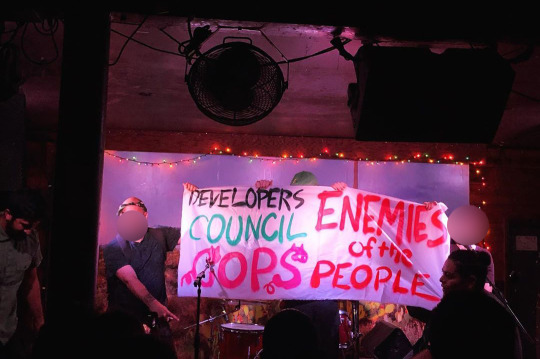
There are some politicians who claim to be against gentrification, but still side with state repression against those fighting for the community. In a confrontation at Hotel Vegas last week, Council Member Greg Casar said he, ‘agrees with what we’re saying, but not always with how we go about it.’
Yet, just last week, Casar supported an action at San Antonio City Council that was calling for paid-sick days. He supports these tactics only when they back his reformist agenda, which is to uphold capitalism through token reforms. The ruling class capitalists can easily take away these reforms when they want (like they’re doing with paid sick days).
Casar is the quintessential middle man for the ruling class. He will take $6,000 from Armbrust and Brown, the developer’s lawyers, and still vote against them. He may vote against the developer’s project, but still supports the arrests of activists that disrupt the ‘decorum’ of Austin city hall. Like one community member said at Hotel Vegas, Greg Casar will ‘sell you out for a single corn chip’. Ironically, he sells out both sides, showing his devotion to centrism and trying to please everybody by standing with nobody.
Then you have Pio Renteria, a straight-up vendido sucio, who is pushing the project in exchange for the $17,000 he received in campaign donations from the developers. Pio is universally hated by the Chicanos and working class of the barrio who have seen him rise to power thanks to gentrifier support and developer cash. He is on another planet when it comes to the struggles of the people in his district.
Finally, there is King Pig Mayor Adler - a millionaire who could only express his frustration with outraged community members, saying, ‘I can’t do this anymore,’ and sent in his pig army to clear the chambers. To this bourgeois parasite, outraged community members are just annoying pests that can be run out at his whim. He has taken $11,000 from the Domain on Riverside interests, and has massive real estate interests himself.

The rest of council are imperialist liberals - nearly all white, wealthy representatives of West Austin or token members of the Black and Chicano oppressed nations like Natasha Harper-Madison and Delia Garza, who play the game of respectability politics. There is also a gay white man, Jimmy Flannigan, who tokenizes this fact, but in reality is nothing but a rainbow capitalist and supporter of the same pigs who brutalized the LGBT masses of Stonewall and continue to brutalize them to this day.
All these other council members are crooks, but they hope to let the Mayor and Renteria take the heat for pushing the project through, or in Casar’s case, provide an air of false concern to the suffering of the masses, while signing off on their repression regardless.
They all just want to get this over with and give the developers what they want, especially since it’s a project in East Austin that mainly affects working class and oppressed nations people, especially Chicanos, Latino immigrants, and black people. They have also shown they could care less about Austin’s being a ‘college town’, because the lower income students who live in East Riverside are disposable to them as well. But we know all hell breaks loose anytime developers try and carry out even smaller projects in their mostly white, wealthy neighborhoods of West Austin.
This is the reality of our city - it is a democracy for the wealthy, for the capitalists, for the developers - and a farce for the working class, oppressed nations, and all others without the power or money to make their voice count. It is why we relentlessly disrupted the city’s process and will not let up on this fight even if they vote to rezone tonight.
City Council might think they will wash their hands of this project after tonight. But the working class doesn’t forget or forgive our oppressors. While much of this struggle has taken place in the anti-people fortress of City Hall, more battles will be fought out in the streets in the time to come.
We call on the working people of Austin and the world to unite to resist gentrification!
NO DOMAIN ON RIVERSIDE! Combat the Displacement of the Working Class in Our Cities!
0 notes
Text
Chapter Twenty-Five : THE EQUALITY ACT

I bet that if you are a french citizen with no instincts to get news from the other side of the Atlantic (other than “Orange Cheeto almost starts war with Iran”), you have no idea what the Equality Act is.
Don’t worry, I got it cover for you.
The Equality Act is a bill put together for the U.S. Congress that would put an amendment on the Civil Rights Act and prohibit discrimination on the basis of sexual orientation and gender identity in areas as varied as education, employment, housing, credit and federal funding. On the contrary to numerous laws acted state by state, the Equality Act protects every Queer Americans from discrimination nationwide.
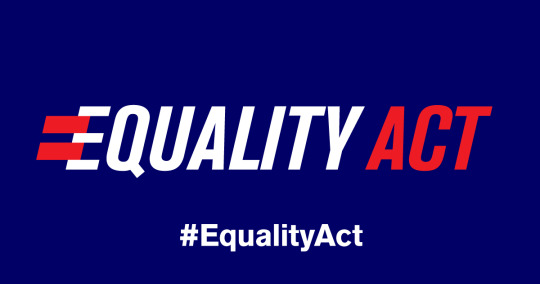
Why am I talking in the present tense ? I don’t know, because that law hasn’t passed yet. But bish, we close. And it’s been a 45-year fight to get there.
I DREAMED A DREAM
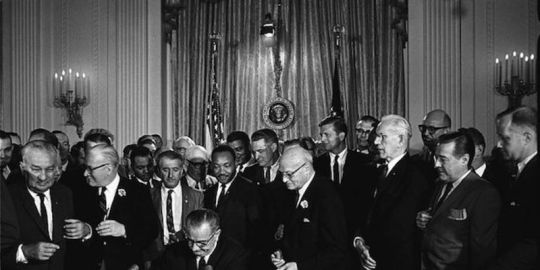
The first Equality Act was conceived in 1974 by Democratic U.S. Representatives Bella Abzug and Ed Koch. Same basics, plus the right to marry — something that was obtained in June 2015. It followed the path of the Civil Rights Act of 1964 that outlaws discrimination on the basis of race, color, religion, sex or national origin, theoretically pulling the plug on racial segregations and unequal application of voter registration requirements. Also following in the footsteps of, those of the Gay Liberation Movement that started in 1969 after the Stonewall Riots (That article is going to be lit!).
Anyway, a bill was offered to the House Committee which decided not to proceed to a vote in the full House of Representatives.
No more concrete tries were made until 20 years later, in 1994, when a revised version of the law called Employment Non-Discrimination Act (ENDA) was introduced to the House. Not as ambitious as its predecessor, it only focused on the hiring and employment situations of LGBTQ+ people based on sexual orientation by employers with at least 15 employees. Narrow shit. Basically, there were conflicts with the inclusion of transgender people in the bill and it never came to fruition. It was presented in every Congress cycle (two years) from 1994 until this year (except between 2005 and 2007, weirdly). BTW, gender identity was added to the proposal in 2007 only. But as I’ve said earlier in my June 21st article, Bush Jr. wasn’t thrilled to see such laws and was ready to veto the cunt out of it. Another version of the ENDA passed the Senate in 2013 but didn’t survive the House.

As of 2019, The United States is one of the few Western nations not to outlaw anti-LGBT discrimination in employment nationally. Only 21 states and Washington D.C. have comprehensive laws prohibiting discrimination. In the rest of them, you can can fired for being gay, evicted for being trans and starved for being a lesbian.
Seems hopeless, doesn’t it ? Well.
YOU LIVE. YOU DIE. YOU LIVE AGAIN.
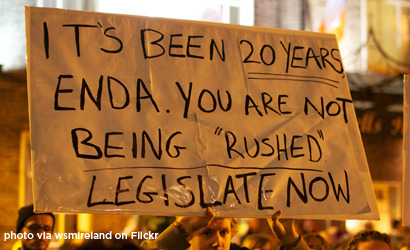
What a strange time to be interested in American Politics. It seems like everything is Hell and beyond and then you get exciting news like this.
I’m getting ahead of myself.
As I’ve said, the law was introduced every single cycle of Congress except one for the past 25 years.
In 2015, it died in committee.
In 2017 well… It died in committee.
On March 13th 2019, Democratic Representative David Cicilline introduced the Equality Act of 2019 in the House of Representatives. The bill was sponsored by a total of 240 Representatives (up from 178 in 2015 and 198 in 2017), including 3 Republicans.
On May 1st 2019 and on a vote of 22–10, the bill passed the House Judiciary Committee for the first time ever. By the time the bill was introduced a final time to a full vote, 8 Republicans voted in favor of the bill with absolutely no opposition from Democrats.
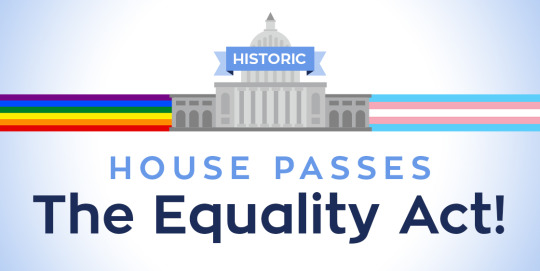
Now, it seems that it’s up to the Senate. When the bill was introduced, it was sponsored by 43 Democrats, 2 Independents and 1 Republican.
The Equality Act is supported across the board by non-profit organizations, Medical and Professional Associations, over 180 American Businesses, the Chamber of Commerce and countless celebrities.
TAYLOR SWIFT.

I shouldn’t even have to say anything else to convince you. TAYLOR MOTHERFUCKIN SWIFT is supporting the bill and PROMOTING it at the end of her newest music video, You Need to Calm Down (#2 on this week’s Billboard Hot 100)
That alone should be a done deal. LISTEN TO HER ! RESPECT. HER. AUTHORITY !

“Shade never made anybody less gay so Oh-Oh (Oh-Oh) Oh-Oh (Oh-Oh) Oh-Oh… You need to calm down… You’re being too loud.. And I’m just like Oh-Oh (Oh-Oh) Oh…”
Oops. Sorry.
Where was I ? Allies ? Yes.
Well, I’ve covered most of them.
SAURON’S ARMY (CUE THE HORN AND VIOLON MUSIC)

You know where this is going. Who hates the Queers more ?
Straight women.
No, kidding.
Jesus Freaks (here we go again)
Numerous religious leaders oppose the bill for multiple reasons, first and foremost claims that it will infringe on religious liberties.
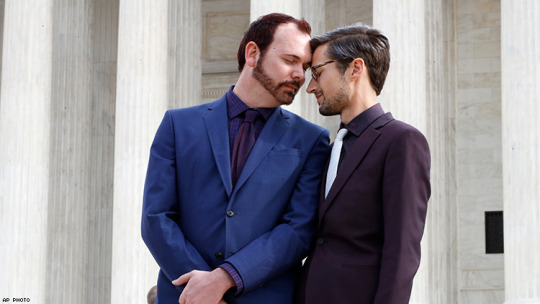
I’ll give you a fine example if there isn’t one.
In July 2012, Charlie Craig and David Mullins visited a bakery named Masterpiece Cakeshop in Lakewood, Colorado. The were looking for the perfect wedding cake, you see. Well, Jack Phillips, the owner of Masterpiece Cakeship, refused to provide a cake for the special occasion. The baker said his Christian faith forbids him to make wedding cakes for gay couples and he used his First Amendment right that guarantees free speech and religious exercise in his life and business.
Craig and Mullins filed a complaint and the Colorado Civil Rights Commission found the baker in clear violation of the anti-discrimination law that is still implemented in this particular state.
Then Jack Phillips, on the advice of his lawyer, decided that his cake making business was more on the lines of artistic expression and not directly business-related and the case went straight to the Supreme Court.
Well, fuck my drag, right ?

In July 2018, the Supreme Court ruled in favor of the baker, 7–2. Phillips’ first amendment right was protected but Craig and Mullins’ discrimination case was left unpunished.
Although the court did not address the wider principle of whether businesses can refuse to serve gay people, it is clear that sooner or later, a case will come into their hands and might change for the worst the fate of Queer people in the United States.
What you need to know in this situation is that the entire judicial system is being shaped by Donald Trump at the moment (and by that bitch Mitch McConnell). Since he took office, he was able to appoint two new justices to the Supreme Court.
Neil Gorsuch became a member of the Court after the death of Justice Scalia — thanks to Bitch McConnell who blocked every Obama appointee until he left office) while the terrible, horrible, no good for nothing Brett Kavanaugh was appointed in 2017 to replace Justice Kennedy, even after the testimony of Christine Blasey Ford in the case of sexual assault in front of a Senate Judiciary Committee.
Justices are appointed for life. Clarence Thomas has been there since 1991. Goddess Ruth Bader Ginsburg since 1993.
Right now, there’s a 5–4 conservative force on the Court. If Ginsburg dies while Trump is still President, the Equality Act might never see the light of day. Bye bye to Roe v Wade as well.

I digress a bit. I was talking about Jesus freaks (who are supporting Donald Trump.. ENOUGH, ALEX. ENOUGH).
The American Family Association published an April 2019 article written by fundamentalist and social commentator Bryan Fischer denouncing the Equality Act, describing the bill as the “Homosexual Supremacy Act” and writing that discrimination against the Queer community is a “social good” and “what public policy is all about”. Here’s a fuller statement :
“There is no equality in this bill for anyone who believes that homosexuality is non-normative sexual behavior and something that should not be promoted, subsidized and celebrated, especially in our schools (…). Children will be condemned to the psychological torment of this dissonance until the day they commit suicide… which 41% of transgenders do.”
Let’s just not vote and elect Bryan Fischer as this year’s Asshole Supreme, kay ? Done. Fuck off, now.
I could keep going with examples of oppositions from religious groups (The Church of Jesus Chris of Latter-Day Saints, Conference of Catholic Bishops, that cunt Cindy Jacobs etc, etc), the point is as with France, the separation of Church and State in the United States of America is only theoretical. Yes, not everyone is governed by their religious beliefs. But that minority is so strong it is able to oppress the rest of the population just by sheer conviction and impressive lobbying.
Fucking Jesus Freaks.
WHAT… NOW ?

Now that the Equality Act passed the House, it is still waiting to be brought up for a vote in the Senate where Majority Leader Bitch McConnell is King and the King considers the Senate as a “graveyard for progressive measures”.
That’s where we’re at. Blocked by a man with no chin and way too much cheekbones. The Republicans control the Senate and there’s not much Americans can do about it.

A poll from Reuters/Ipsos revealed that 45% of respondents incorrectly believed that federal protections for Queer people in America was already in place. Another poll from Gallup put the beliefs for new legislation at 53%.
As an American citizen (and I am not so I’m fucking powerless), there’s not much you can do but :
Sign a petition, either Taylor Swift’s on Change.org (close to 400,000 signatures have been collected as of the writing of the article) or the Human Rights Campaign petition. I signed them both and shared it on my social media. Go do that too.
Call your representatives, especially if they’re Republicans. E-mail your Senators. Lobby hard. Pressure is key to success. Politicians are worst sissies than Zaza.
Come November 2020, do not vote for Orange Cheeto. That’s ludicrous behavior, on the verge of self-sadistic.

All that to say to non-American readers, U.S politics is compelling. It’s a shit show like no other, but at least keep an eye on this Equality Act. I have atheist faith in it. Which is rational hopes on a brighter future.
“Oh Oh (Oh Oh) Oh Oh (Oh Oh)
You need to just stop,
Can you just not stepping on our gowns
You need to calm down”
- Taylor Swift, 2019.

0 notes
Text
Dark Mirror Month
Some months before the events of Dark Mirror...
Another day.
After the several week-long diplomatic mission to Zakaz and Xia - former led by a brute of a Ga-Toa who rules by breaking necks and latter by a corrupt seductress who knows she’ll get away with whatever she does on account of being “close friends” with the Empress - Koradak felt dead inside. Part of him wondered how the Empire managed to function with the glaring differences between the Overseers and rampant corruption of the higher ups.
Another protest.
As he arrived back home late in the evening, flanked by his Nuurakh bodyguards, the town center - yes, they finally had one - was filled by another protest led by the local secessionists. The leader, a stout reactionary, was practically shouting about the injustices that the Empire brought to Stelts. His Stelts, not the bruisers they belittled, the giants they forced to fight for their entertainment, or the Matoran who lived in inns because legally speaking they weren’t allowed to buy property.
The local Toa arrived pretty quickly. “No gatherings larger than six that haven’t been approved by the Overseer,” but everyone knew what that meant: no criticism of the Empire.
Someone threw a brick. Hit the Vo-Toa enforcer straight in the eye.
Vahki are dispatched, protesters fall to the ground in pain and shock from the bolts of lightning. The few who raise their arms and surrender are forced down. The leader is beaten into a pulp by two bruisers, who only stop when told to. Toa drag him away and the bruisers pick up the wounded haphazardly. No need to be merciful or gentle when these people wish you were under their heels.
Another death.
As he got back to the Overseer’s Mansion, a Matoran servant passed him and asked to see the Overseer to give him a report. Few of the protesters were in critical condition, three were dead - including the leader. Those outside of the government officials don’t know how many of those in “critical condition” are dragged off and never seen again. Where they go, only Overseer’s do. The poor sods don’t even get a proper burial from their friends and family. The doorman lets him pass without batting an eye.
Another lost light.
As the Matoran briskly walks off, Koradak dismisses his Nuurakh and walked forth. The doorman, Akiwaika, a large, imposing man with serrated claws - the very same who helped him during his tenure as a slave-gladiator - mock-salutes him with a smile.
“Welcome home, Vice Overseer Koradak,” he nodded. “An exhausting trip, I take it?”
“You have no idea,” Koradak sighed as he passed him. “Overseer Otala was easily the most unlikable and punchable person I’ve met. Even worse than Roodaka.”
“What about the other Vice Overseers?” Akiwaika asked out of curiosity. Overseers rarely if ever cared for their staff or servants, but Koradak was kind and liked enough that even janitors could ask him for a favor or a chance to talk, much to their surprise. Normally, they would be chastised for that and lose their jobs. Or worse.
Koradak pondered for a moment before answering. “Vice Overseer Nektann was equally brutish, but he seemed relatively secular compared to other Overseers, and I noticed he was glad of Zakaz being united at last,” he finally answered. “I also noticed his displeasure with Otala, which says a lot about a Skakdi.”
“And Xian Vice Overseer?”
“I didn’t meet her,” Koradak stated. “She was away at the time, I understood.” Akiwaika nodded in understanding.
The two talked for a while about small matters before bidding their farewells, leaving for the night. Akiwaika slept in the basement since he didn’t have a room large enough for his frame, but didn’t seem to mind. Koradak had asked him several times about it, but he insisted he was fine with this set up.
As he reached his dorm, he noticed the door wasn’t locked. One of the cleaners must have forgotten to close it, he thought.
He jumped as he saw a Toa of Shadow, wearing golden Kanohi Komau and armor that clashed with his natural pitch black color, sitting on his chair, next to him a large insectoid giant.
Another tyrant.
“Evening, Koradak,” Voya Nui’s Overseer Bedrock - or “Obsidian” as he called himself nowadays - greeted him with a smile on his face, uncanny with the outright demonic crimson eyes he bore. Quake, her carapace decorated with small pieces of gold stood unmoving next to him.
Koradak took a second or two to compose from the shock. “What are you doing here??”
“I wanted to see how my favourite Vice Overseer was doing,” Obsidian answered jokingly, standing up from the chair. “Same as you: diplomatic mission to Metru Nui on Empress Tuyet’s behalf. I chose to stop by some islands while I was at it, and local Overseer was kind enough to house me for the night. He told me where you were while he was at it.”
Koradak frowned with worry. “And you’re fine with that? I did tell you that the locals are losing faith in the Empire...”
“Nonsense,” Obsidian stopped him with a wave of his hand. “I’ve seen the enemies you’re fighting. They are all worms comparing themselves to eagles,” he said, stepping up to Koradak. “Besides, if they left us, the Empire would never let Stelt exist as an independent entity ever again. They know that.”
Koradak scratched his neck. Bedrock was a known xenophobe back on Odina, but upon betraying Shadowed One, letting the Toa in and becoming Obsidian, he... changed a lot. And he meant a lot. Was it because of the Empire? What did they do to him?
“I meant to ask you, by the way,” Obsidian inquired. “How have you been?”
“Oh, uh, fine,” Koradak lied. “Just fine.” Obsidian chuckled.
“Of course,” he humored him. “Nothing like an oppressive dictatorship led by the embodiment of a bar fight and a corrupt pseudo-slaver. That Otala, though, she might seem like a brute, but the Skakdi need a strong and independent leader. You know how they are, that race of warmongers.”
Koradak cringed inside.
“Roodaka has no excuse, though,” Obsidian admitted. “I don’t know what Tuyet is thinking, but I know for certain that she’s going to betray us the second she has the chance to, I’ll give you that much.”
“That’s not because of her sexism, is it?”
“More like pragmatism,” Obsidian rolled his eyes. “They say she hates men, but the truth is it’s an ages old belief that has embed itself deep into Xian culture. Instead of fighting it, she decided to let the women in charge use their men however they please for extra profit. She’d do the same to women if she was a man and the situation was reversed. Cynicist garbage, but I have to give it to her: she has a fantastic back-”
Koradak elbowed him.
“-door bargaining skill,” Obsidian finished. "That too, but you have no idea how many rookies she’s made look the other way, and not because of her looks. Some of the poor blokes think she actually cares for them.”
“I feel like I have an idea,” he answered dryly. “I was there.”
“Oh please,” Obsidian said, circling Koradak. “I know that the Empire and the Overseers don’t see eye to eye with you, but you don’t need to be that cold to me. I saved you from the Shadowed One, after all.”
He wasn’t wrong, really. When the Shadowed One heard of the rebellion among his ranks, he began to disintegrate people left and right. He would have been next had it not been for Bedrock launching blasts of shadow to distract him.
He put his arm around Koradak’s neck. “That reminds me,” he asked in a serious tone. “Do you mind if I sleep here? The Overseer said that while he didn’t have free rooms, he could make some but I figured that you wouldn’t mind if I occupied the couch for the night.”
The Stelt was flustered, unsure what to say.
“I...”
Toa of Shadow’s smile turned increasingly bashful.
“Got you, didn’t I?” He asked as he backed into the door, Koradak shaking his head and rolling his eyes accompanied by a groan. “Sorry, I couldn’t resist. You’re probably exhausted, so I’ll leave you for the night.” He motioned for Quake, who stepped up to leave the room. “We’ll talk about things later tomorrow.”
“Good night,” Koradak said after him. Obsidian waved as he left for his room.
“Tomorrow, then,” Quake said, as she closed the door after herself. She most likely had a lot to say, but chose not to for the sake of letting Obsidian talk.
Left to his own devices, Koradak stood still for some minute before he went to his desk. Reports for the time he had been gone are all neatly stacked. He glanced over and read the top one. Visitors from the past week. Most of the page was - naturally - empty.
Weird to say that, even after centuries of working here. “There were some thirty five visitors past week.” Had someone written a work of fiction about dystopian future where Stelt of all places received less than fifty visitors or passerby’s a week some two thousand years ago, he would have been laughed at for being unrealistic.
Another evening.
He decided to leave the reports for tomorrow. It was late, and he could use sleep.
Slumping onto his bed, Koradak’s eyes quickly grew heavy.
3 notes
·
View notes
Photo

"I want to fucking kill all the leakers" Y'all, this country is a fucking joke. The president, the house staff, congress, state reps, fuck every single one of them. I fucking hate everyone. Building a government on greed, oppression, class war, racism, sexism, fear mongering and war profiteering. Fuck the people in power, and if I go to jail or die fighting that, I'll be doing fucking fine. Fuck all this shit. Fuck it forever. Fuck the cops, fuck the Feds, fuck bankers, fuck Bruce Rauner. Fuck Scaramucci. Fuck. Donald. Trump. Fuck the GOP, and the the healthcare repeal. Y'all are killing millions. That's a class genocide. Call my generation lazy and entitled and then you kill us off. Eat shit. #resist #fucktrump #fuckscaramucci #fuckthegop #fuckthepolice #classwar #racism #classism #anarchism #fuckthefeds #eatshit #amerikkka #fuckamerica #fuckworldtrade #fuckmoney #fuckclass #nogodsnomasters #burndowntheamericanplantation #radicalabolitionist #fuckcolonialism #fuckwhitepeople
#fuckcolonialism#radicalabolitionist#fuckthepolice#fucktrump#fuckamerica#fuckmoney#fuckthegop#classism#amerikkka#fuckwhitepeople#nogodsnomasters#burndowntheamericanplantation#anarchism#classwar#resist#fuckscaramucci#eatshit#fuckclass#racism#fuckthefeds#fuckworldtrade
3 notes
·
View notes
Text
Linguistics and Social Justice
This past weekend I was on a work trip to a prestigious university, and I heard two phrases during presentations that made me wince a little on the inside. Both phrases were used by people who are progressive and well-meaning. They probably don’t even agree with the implications of their phrasing, but they were presenting publicly, extemporaneously, and this was the mode of expression that came to them. I’m not pointing out the deficiencies of their phrasing in order to shame or blame them. I’m pointing them out because it is only by constant awareness and introspection as a society that we can change our default settings.
First, a female English teacher was describing a collaboration with the Body Project, whose goal, she said, is “to help women feel better about their appearance.” (Note that The Body Project itself does not use this language.) That phrasing, to me, says that feeling bad about their physical appearance is a failing or weakness of women. It says that we as a society need to change women to make them more confident despite the messages they receive to the contrary – rather than changing the messages. Again, I don’t think the English teacher herself feels that way. Furthermore, there is a fine line between changing the messages and changing the way women (and others) react to them. However, this is a consistent theme in our society that we need to be aware of: when are we putting the onus on the victim to change, rather than on the oppressor?
Second, in talking about increasing privileged urban Han Chinese students’ awareness of social issues in China, an administrator talked about showing them “their responsibility as the majority to protect the minority.” This administrator, again, is very aware of social justice issues and opposes the commodification of minority culture and the uneven power dynamics of charity. However, the phrasing he used – that word “protect” – presumes and even necessitates an unequal relationship between the Han and the minority ethnic groups. Instead, showing students the reality of their participation in an oppressive society and letting them come to conclusions about the need for solidarity among different groups in order to subvert that system would restore at least some measure of power to the minority cultures.
Finally, unrelated to the trip, I also read an article recently about the effectiveness of violent (where the definition of violent includes destruction of property) vs. non-violent protests in attracting new adherents to a cause. The study showed definitively that non-violent protests were more effective, which is not at all surprising. However, there are several issues with the assumption that therefore, all protests should be non-violent. The following ideas are informed by this article.
1. Even if protesters are totally non-violent, police and counter-protesters may disrupt the order and attempt to blame the protesters. This will happen more when protesters express ideas (even non-violent) that threaten the interests of the state, and yet more when protesters of color or other minority status express those ideas. Non-violent protest is a privilege.
2. Many protests are trying to call attention to issues of great violence, which are of extreme emotional importance to the protesters – e.g. hate crimes against trans people, police brutality, and more. After conducting nonviolent protest after nonviolent protest that goes ignored, destruction of property or similar forms of “violence” may be the only way to bring visibility to the greater violence perpetrated against them.
3. Having a large number of adherents to a cause is of no use unless those adherents are willing to put their beliefs into action, which for “radical” causes often involves committing illegal (though not necessarily violent) acts, such as nonpayment of taxes, noncompliance with police orders, noncompliance with immigration law, etc.
4. The goal of many protests is to challenge the respect that the public has for authority figures such as the police, and for the sanctity of property and profit. Destruction of property by protesters is treated as a greater evil than the use of sweatshop labor by corporations, or the bombing of innocents by the government. Such protests aim to call attention to this hypocrisy.
#social justice#linguistics#words matter#violence#vandalism#anarchism#state violence#protests#nonviolence
5 notes
·
View notes
Text
Aspiring to a kind of monograph on the American Descendants of Slavery movement, Understanding ADOS ultimately amounts to nothing more than a drowsy 27-pg. read in which the prevailing (and, honestly, at this point tiresome) misrenderings and baseless claims about #ADOS are tidily brought together into one undergrad-like capstone project.
In those twenty-seven pages, Aiwuyor manages to offer literally nothing new in terms of information about the movement, or actual evidence that would serve to substantiate the familiar allegations and assumptions that she is obviously eager to recapitulate to her audience of like-minded opponents of #ADOS. She just adds a scholarly sheen to them.
Topmost among these is, of course, the so-called ‘anti’-immigrant position of the group (the word immigrant appears a total of 47 times throughout the report). According to Aiwuyor, ADOS was “created in 2016 to describe and distinctly separate Black Americans/African Americans from Black immigrant communities.” This is—for most commentators on #ADOS—proving to be the rhetorical pocket into which they most like to settle when lobbing invectives at the movement. And for obvious reasons. It’s somewhere between not being completely dishonest with their readers (indeed, ADOS was formed for purposes of distinguishing their group from black immigrants), but also not being anywhere near entirely truthful with them, either.
Because to be truthful with a reader would be to describe the reality that nearly half of black immigrants in the U.S. arrived here in 2000 or later (45%). More than half of those came after 2006. Almost 1/3 of black immigrants in the U.S. say they came here before 1990, while the rest say that they arrived in the ‘90s. And so when we talk about black immigrants, we are talking essentially about a group comprised of first and second generation families. And I think to the extent that we can all agree that—yes, absolutely—to be a black person in America is to obviously experience anti-black discrimination, we maybe need to ask ourselves if it’s really so unreasonable that ADOS feels that when it comes time for the government to settle up its debts for the country’s profiting off the institutionalization of antiblackness, there’s a very real difference between the amount owed for the material harms that have encompassed twelve generations of one people, and those that are largely confined to recent arrivals (and who, it should be added, voluntarily elected to come here.)
Enter ADOS.
And one sort of just has to wonder about a mind like Aiwuyor’s which seems to so object to the idea of fairness that inheres in making these kinds of distinctions. Her eagerness to make that idea seem so hateful. All I know is that if I’m out to eat with a group of people and I order a few drinks and an expensive main course while my dinnermates opt for salad and lemon water, I absolutely want Aiwuyor at the table when the bill arrives and for her to be bringing that same energy, passion and conviction about making distinctions being a misguided and hateful thing to do. I mean, we all sat at the same table, right? Had basically the same experience? Sure. And if you say the analogy doesn’t work, then I don’t know if you’ve ever felt that special sort of resentment towards a person who—after such observably dissimilar and unequal experiences—has the temerity to suggest everyone go even. Now imagine just how pitched that resentment would be in the context of recompense for the oppression of American Descendants of Slavery when someone suggests—no, when someone demands—essentially that after centuries.
And but this is sort of precisely the thing, isn’t it? When you read these denunciations of #ADOS, you get the sense that it’s as if the last century and a half has not even happened. That the post-emancipation period in America did not constitute decades upon decades upon decades of public policy that essentially set up a pick and roll for white capital to power drive to the basket while black people were being left laid out on their back on the court they built. And the fact is that when you compare the data on socioeconomic positioning upon arrival—and how, when adjusted for age, second generation black immigrants are upwardly mobile in terms of income and education—it is apparent that the difference in history and experience allows families of foreign-born blacks to curl that screen in ways that native population simply cannot.
Including a works cited page on your anti-#ADOS screed isn’t going to change this. But reparations for ADOS will. And for all of Understanding ADOS’s pretense to moral authority and empiricism, it is, in sum, a thinly researched, blatantly deceptive and bloated opinion piece by a writer whose ahistorical sensibilities are symptomatic of a growing anxiety among an elite class of academics and beltway careerists whose entire fancy intellectual pedigree threatens to be exploded by the success of #ADOS. I guess I’d be freaking out, too.
0 notes
Text
5. The Government Building
Don’t have the time/patience/desire to read with your eyes? Don’t have eyes? Well, have your friend read you this: You can check out the audiobook for free on Apple, Google, Stitcher, or Spotify. Subscribe for new episodes every Wednesday!

20 December 2054 // 1400h.
On the north side of Idaho Park, the width of an entire block, is an eight-story building known by such monikers as “The Terrible Tower,” “The Beige House,” and, in more recent years, “Krispy Kreme”.
The real name of this building was, simply, The Government Building, and it was likely this title’s blandness that made the place so ripe for nicknames.
As with any government, certain citizens found plenty to complain about. Some called the giant building an eyesore. Others considered it a towering monument of oppression lording over the town. In reality, the GB was as big as it was because it was the only building in town that housed Government Offices. The lawmakers and courts were there, as were the departments of resources and infrastructure, as was the treasury, as was the police force.
Another common, and obvious, complaint dealt with the taxes it must have taken to build this structure and support what must be a robust government operation. In fact, taxes in New Idaho were lower than anywhere else in the country. This was due to some forward-thinking for-profit operations run by the Mayor’s Department of Recreation. A membership gym occupied the second floor, and a penthouse cafe on the eighth floor was wildly popular.
In addition to its for-profit services, the Government Building also gave extensive, entertaining tours of its inner-workings for a modest fee. The greatest source of revenue, however, was the IdahoCam, a Virtual Reality system that allowed anyone from anywhere in the world to take a virtual stroll around the Government Building of New Idaho whenever they liked for only $7 a month. Surprisingly, this service was in high demand, especially for curious Americans outside of Idaho, and the Mayor always made sure to include surprise performances and Easter Eggs for the subscribers.
Some areas of the building, however, were confidential, and could not be entered virtually. One of these areas was the party-planning office on the north-eastern wing of the fourth floor. The Government of New Idaho was known to throw some of the best block parties in the country, and they didn’t want their secret to get out. Though anyone was welcome to try, few could legitimately compete with the Official New Idaho Party Planning Committee. Add a reasonable admissions charge, and the Government made a decent amount of money on these events about four times a year.
All this amounted to a civil society with very low taxes. New Idaho was founded by entrepreneurs on the progressive idea that a government should make their own profit, and these systems evolved as the city was established. None, however, had taken the city to such low taxes and high profits as the current mayor, Kiyoshi Krispyman.
Krispyman was elected in 2050, and had just been elected for two more years this past November. He had spent the last four years revamping the IdahoCam program, improving the seasonal Government Parties, and improving the structure of New Idaho’s basic income by introducing programs such as New Idaho’s “Museum of Oddities”. These programs both lowered taxes and allowed most people to make a livable wage in the Museum or any of its partner programs. Kiyoshi was considered, by most, to be a business mastermind, and an excellent example for local governments everywhere.
Kiyoshi’s office was located on the seventh floor of the building, with a South-facing window that allowed a great view all the wildlife of the Jungle and a small bit of the University beyond.
This afternoon he was sitting across from his main advisor, Vice Mayor Jessica Jordan.
‘Listen to this.’ Kiyoshi was reading a memo through his Lenses as he looked out onto the Jungle. ‘“Dear Mr. Krispyman, I hope you are doing well. I have always appreciated your hands-off approach to government… yada yada… I understand and respect the government’s final say in projects of infrastructure. The privatization of roadways is a tough nut to crack, and I appreciate you doing well to keep the infrastructure of New Idaho solid.
‘“It is with the utmost respect, then, that I ask you to consider allowing Lucid Labs to build a Hume-Tube system around the town.” Any guesses what a Hume-Tube is, Jessica?’
‘It sounds like it removes bad smells or something. But I guess that would be a “Fume-Tube”.’
Kiyoshi Continued. ’“The Hume-Tube is a new technology, patent-pending, from Lucid Labs. The Hume-Tube transports humans quickly, without bikes, from one section of town to another.” He goes on. He explains the logistics… blah, blah, blah… I’ll forward you the email, you can read the rest. It seems that Lucid-San wants to create a new hyper-tube system that lets him transport his employees from areas of the city to the Labs.’
‘And what do you think of that?’
‘My guess—he’s just planting a seed. The patent hasn’t even gone through. Seems like a lot of big ideas. But he has to let us know that it is in the works.’
‘So are we going to let him do it?’
‘Regulation has never been my style, has it?’
‘You don’t think it might be a bit of an eye-sore?’
‘Who am I to say? We will make sure it doesn't get in the way of everyone else’s operations. After that, might as well let Lucid-San do what he thinks is best. It is basically his city, after all.’
‘Well, his and Aubrey’s.’
‘Well put.’
‘I imagine he wants to get some sort of official okay before another mayor is elected, as well.’
‘Well then I guess he has two more years to butter my belt. Guess that’s why he waited for December, huh?’
‘Guess so.’
Kiyoshi sat down behind his desk, then spun his chair around so he faced out toward the Jungle again. He was 55 years old, but could have been in his thirties: Short, jet-black hair, lean, muscular build, and less wrinkles on his face than on the suit of a サラリーマン. His parents had worked hard to successfully emigrate from Japan in the ‘90s, and he inherited their strong will and good genetics. It had taken him 51 years, but he finally got a gig he was truly proud of—Mayor of the City of the Century. And a damn good one, too. He loved his view of the Jungle, the campus beyond, and the mountain peaks beyond that. He never had to travel anywhere else in America, or the world for that matter—he was fine right here.
‘Spuck is coming in soon, yeah?’ he asked Jessica.
‘In fact, he just buzzed in.’
‘Send him up! Thank you!’
‘Do you want me in this meeting?’
‘Sure, that could be a good idea. You have to be my witness. Make sure he doesn’t bribe me with gold or anything.’
Jarek Spuck was the CEO of MineShaft, and one of the youngest business magnates in New Idaho. At only 26-years-old, he was valued at $25 Million. Though he wasn’t the brains behind MineShaft, once his father had left it to him and showed him around, he was a whiz at keeping the business moving and profitable.
‘Jarek!’ Kiyoshi said, bowing to his acquaintance across the table. ‘Have a seat!’
Jarek sat down and shook Kiyoshi’s hand. ‘Krispy-San. 久しぶり!’
‘Ahh, I think you misuse the expression! We had lunch two weeks ago!’
‘I guess a week seems a bit longer at my age.’
‘You calling me old?’
‘No, sir. Though you are twice as old as me.’
‘More! Sadly, it is so. So, Jarek, what are we talking about today?’
‘The MineShaft Program.’
‘Yes?’
‘Well first, I must thank you for the program at all. Who would have thought that at 2054 humans would still be more effective than AI?’
‘I am quite surprised by the lag in AI. Self-driving bikes all around, but the androids still aren’t dreaming of electric sheep.’
‘Exactly. Certainly not robots as small as those in MineShaft.’
‘And your issue?’
‘Hm?’
‘I’m sure you aren’t here just to thank me. What’s wrong?’
‘Yes. Of course. The issue. Well, we’ve been getting some pushback. I thought you should know.’
‘Pushback? From who?’
‘Well, parents mostly. Some college students. And I think the latter’s interest in the topic is poised to grow—you know how these things can spread once the student body gets wind of it. And the parents seem to be organizing to make sure they do.’
‘My guess. They want you to pay minimum wage.’
‘The parents are asking for even more than that.’
Kiyoshi sighed. This was expected, but such a hassle. ‘They realize that you are employing anyone who asks for a job? Is guaranteed work not a fair trade for a lower wage?’
‘Apparently they don’t see it that way.’
The federal government saw it that way—for now. If there was a big enough stink about it, of course, the plug could easily be pulled on the whole operation. It had been a huge success when Kiyoshi first unveiled the partnership, three years ago. People were happy. But people get too comfortable. Then they want more.
‘And if you were forced to pay them the federal minimum wage?’
‘You know the federal wage doesn’t make any sense New Idaho. the taxes are so low and our farms are so efficient, our quality of life per dollar spent is unheard of.’
‘Yes, but if you were forced to?’
‘Well, that would either mean the end of our deal or some extreme renegotiations. I can’t guarantee everyone in New Idaho a job at the federal minimum wage. At half that, it works out. Otherwise, it just doesn’t make any business sense.’
‘And that, my greedy friend, is why people will hate you. Jarek Spuck, dirty, deplorable capitalist.’
Jarek laughed. ‘You know I don’t care about that. Look, I like to employ as many people as I do. It makes life easier for me, and anyone can get paid to play video games. Everybody wins.’
‘Again—not the way they see it.’
‘No. And I haven’t even gotten to the worst of it. The trump card.’
‘And that is?’
‘The parents are complaining about trauma.’
‘Trauma?’
‘Yes. Trauma from “poor working conditions”. Like having to kill the occasional rat. They say that it’s cruel to pay their children by simulating murder. They worry about the future implications.’
‘Weren’t war simulators some of the first playable games on the VR market?’
‘I guess it’s different when you bring money into the picture.’
‘How?’
‘Well, I guess because they feel coerced to play this game. Therefore, in their minds, we are coercing their children to murder. It no longer feels like a choice to them.’
‘But it is a choice!’
‘They… Don’t see it that way.’
Kiyoshi stood up and stared at the back of his hands as he rested his palms on his desk.
‘They are using this argument to bargain for a raise,’ Jarek said.
‘And if they keep playing this up, the Fed may just step in and outlaw the game altogether.’
‘My thoughts exactly. Then we are looking at much more than halving the work force.’
‘Let kids play the game if they want to! If they don’t like it, they can always play Mapper.’
‘Of course they would rather fly drones over the countryside. But Mapper pays less.’
‘So I imagine I’ll be having a meeting with Rachel soon, too.’
‘It’s quite possible.’
‘Well, thank you for bringing it to my attention, Spuck-San.’
‘Spuck-San sounds pretty horrible.’
‘I didn’t choose your last name,’ Kiyoshi said with a smile.
‘じゃまた.’ Jarek shook Kiyoshi's hand, bowed, and left the room.
Kiyoshi began packing to walk home. That was enough drama for one day, and he needed time to think. If they were forced to play by the federal minimum wage, it would have implications that could potentially topple the Guaranteed Basic Income he had worked so hard to negotiate. There would be unemployment, an issue that hadn’t existed by anything other than choice since the introduction of the Programs. There would be demands for welfare. Which would mean higher taxes. Which would mean…
What a headache. Politics really suck sometimes. Well, Kiyoshi thought, he could think about all of that on his walk. For now, everything was fine. He packed his bag and said goodbye to Jessica, who knew better than to re-open the topic so soon. He exited the Government Building and walked toward the Jungle.
#New Idaho#Ben Vizy#New Novel#WRiting#Writing Community#Novelist#Novel Writing#2054#Augmented Reality#Futurism#New Government#Libertarian#Low Taxes
0 notes